- Scott Mckeating
- Albums and Singles
There are few, if actually any, musical series’ at the moment as interesting as Jandek’s chronological live releases. With his twenty five year old ‘Texan loner’ tag finally being shed, his live releases are revealing a whole experience to fans of his disturbingly bare vocal/guitar confessions. After the indifferent Austin Sunday release, Jandek seems to have taken some wise soul’s advice, getting players with improvisational chops in instead of local backroom bums.
Backed by Chris Corsano on drums, Matt Heyner on bass and Loren Connors on guitar, the oddly subtitled ‘Afternoon of Insensitivity’ (odd because Jandek sounds anything but insensitive over these two discs) is his most composed sounding set to date. Jandek spends the LP away from his customary live set-up of electric guitar and sits behind the staple instrument of sanctum seekers, the organ (well, a Korg synth set to organ). He certainly seems able to express himself more traditionally through this instrument, as opposed to his signature untrained guitar style. This trio of musicians collude in a mutual conspiracy to shelter and protect Jandek from slipping into skeletal soloisms, perhaps overexposing the natural spookiness of the organ. Loren Connors plays out of his self, his guitar opening up in liquid swirls, his pedals spreading sound across the show in great strokes.
The rhythm section moves steadily in the footsteps of the organ, much of Corsano’s playing like pensive, beautiful footsteps beneath Connors and Jandek. His role feels more obviously rhythmic than Alex Neilson’s drumming work on three of the previous live releases, snare shots like candle points in the fog. Vocally, there’s an initial surprise as he actually sounds unsure about what he’s saying, perhaps even a little shy. Though why Jandek should choose his fiftieth album to get all reticent on us is anyone’s guess. This slip doesn’t last long though (stage fright?) and soon he’s back to his undulant matter of fact confessions. It’s interesting to see that brief glimpse of something behind the impassive mask, Jandek normally ignoring the crowd’s presence beyond a few rare recorded smiles. Manhattan Tuesday follows the usual lyrical routes, the sheer strength of his imagery and questions always overcoming his dependence on the themes of isolation, alienation and lost love. Its beginning to really feel like Jandek has been slowly becoming more capable of accurately describing his incipient awareness of the internal world.
Read More
- Administrator
- Albums and Singles
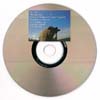 Scuttlebutt around the intertubes is that no, this is not the product of one "Karen Tregaskin" discovered via a Myspace site, but actually good ol' Richard D. James. Regardless of its pedigree, it's a nice slab of throwback electro that is as fascinating for nostalgic reasons as it is for its overall listening value.
Scuttlebutt around the intertubes is that no, this is not the product of one "Karen Tregaskin" discovered via a Myspace site, but actually good ol' Richard D. James. Regardless of its pedigree, it's a nice slab of throwback electro that is as fascinating for nostalgic reasons as it is for its overall listening value.
From the look and sound of this disc, it certainly could be an Aphex Twin related project, from the abstract song titles, ultra minimal packaging, and an overwhelming playful, yet complex arrangement of analog synths. However, the sound sticks closer to his AFX moniker, where rather than spastic programming and stuttering drums, the sound is much more indebted to early 1980s electro and Detroit techno. The Tuss wear his/her/their nostalgia openly on "Synthacon 9," where an intentionally stiff 808 drum track is augmented with synth lines that could have been stolen from Prince circa 1982, along with a bit of playful reverb thrown in for good measure. Other than the more contemporary drum & bass elements that seep in towards the end, this could very easily be a 25 year old track. "Shiz Ko E" is another treat for the older folks, fragments of Commodore 64 synthetic speech, acid house sequences, and a pitch bent synth line straight from the backrooms of the Kool and the Gang compound.
The disc doesn't rely solely on memories of sweaty 80’s clubs though, there are a good deal of tracks that show more current elements as well. "Last Rushup 10 F" has the hyperspeed breakbeats that are expected in this day in age, but keeps things grounded with actual melodies, vocoder synths, and more playful applications of reverb, which is never a bad thing. Breakbeats of a more jazzy variety (think Squarepusher) also show up on "Rushup I Bank 12" with cheap computer sound effects and even a bit of lounge-y piano to go along with the 303 squelch.
Whether this is actually Richard D. James or not is somewhat irrelevant, because it is a damn good disc of old school techno that manages to bring up the nostalgia of the early days without sounding too dated or insincere. One can at least hope that The Tuss makes up for the lack of productivity from a certain Rephlex label head, hint hint.
samples:
Read More
- Administrator
- Albums and Singles
"Northern’s debut offering, another in Infraction’s sweet sleep-stream of supine-inclined ambience,
are bros of Canada, Davin and Kevin Chong, dealers in heating up cool digitalia with toasty warm
sample food. Drawn is a study in turning lost to found sound, capturing momentary guitar passes,
and releasing them, subtly altered, into enduring motifs, finding felicity in the fleeting and
making it stay awhile to become compelling. What happens is that this Northern music initially
seems to drift by asking nothing from you, but you gradually find yourself, oddly, wanting from
it. And it yields graciously. In being quiet, unwanting, you want to be quiet with it. It’s
the New Quiet.
The album opens with “Coasting” in zones that distantly recall those charted by Loscil
(Submers and First Narrows), the aqueous becoming a subtle leitmotif (cf. the later “Pacific”).
The architecture becomes more digitally-enhanced, espousing sound 12k principles. Shuttle358,
Taylor Deupree, and Fourcolor would all seem to be Northern touchstones, sharing a similar
delight in deployment of small gesture processed loopstrata, fluting, floating, fibrillating –
at once a surface over which to skitter a glitch-scatter and a cushion for repose. No fear of
Northern exposure here at the warmer end of digital, gently meshing textures, lapping into
laptop. It’s a deceptively small sound that can get big on you, like on “Migrate”, which
dwells in semi-stasis just long enough to lull, then spills over with swells before slipping
out of sight. Drawn’s digital means of generation takes on an increasingly naturalistic
sounding aspect helped by its manipulated guitar-enriched intake. The guitar tradition
drawn on Drawn is the ostinato introspections and plucked intimacies of 1 mile North,
Labradford, and Dan Abrams. Ostensibly different from Infraction stable signature sound,
it somehow sits comfortably within it.
The first 150 copies come bountifully endowed with a bonus cd-r, Jessa (INFX 025), a collection
which signals the next phase in Northern development, though the seeds of Jessa’s future-indicative
are retievable from Drawn’s present-past. It evidences a deeper denser dronier zone-out music,
minimizing digital intervention and renouncing microsonic patter. The gestures here are towards a
half-light almost-orchestralism, moving from the likes of Marsen Jules and the secular sacral of
Eluvium, shoulder-to-shoulder with the submersible slowcore starriness of The Lid (whose time of
greatest influence and recognition has finally now come). Sidenote: Northern bid their myspace
visitors: “be quiet with us.” More resonances of SotL, and their “Be Little with Me”? Sshhh. It’s
Northern. It’s the New Quiet." (A. Lockett)
Comes housed in Stoughton style mini-lp gatefold sleeve. Down to 10 copies of the limited edition!
Info : www.infractionrecords.com/shop.html
www.myspace.com/northerncanada
Listen : www.infractionrecords.com/audio.html
Read More
- Administrator
- Albums and Singles
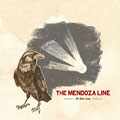 This set marks the end of Tim Bracy and Shannon McArdles' marriage and musical collaboration. 30 Year Low is a terrific document of the death of love, the inevitability of aging, and is proof positive that in all musical genres, quality matters more than anything else.
This set marks the end of Tim Bracy and Shannon McArdles' marriage and musical collaboration. 30 Year Low is a terrific document of the death of love, the inevitability of aging, and is proof positive that in all musical genres, quality matters more than anything else.
This is a sophisticated album invested with personal conviction. The Mendoza Line handle the subject matter (bars, bedrooms, heartbreaks and fears), and the unadorned old-school instrumentation (guitars, bass drums, piano) with a masterful aplomb that lifts 30 Year Low above the average alt-country rock. Mixing the personal and political, the opening track "Since I Came" is sung from the perspective of a pregnant immigrant laborer at a chicken factory in the backwoods of Georgia. Her husband has been killed, possibly murdered, leaving her to survive with their two daughters. The song shuffles along, sad and subtle, but the smell of feathers and the fear of unwanted sexual attention are overwhelming. McArdle’s voice captures feelings of being undocumented and vulnerable, lonely and fleetingly suicidal, before emerging defiant and determined: "Could I find my way out/ Could my two girls grow up to be free/ If you ever touch a hair on their heads/ If you ever look at them the way you do me." "Since I Came" could stand as a companion piece to Merry Men, Carolyn Chute's book about ordinary people discarded by President Reagan's voodoo economics.
"Aspect Of An Old Maid" is a splendid mid-tempo duet, on which the accusatory insights pick up. It has an old-fashioned quality stemming from the decorous harmonica and a words-to-the-bar ratio that was not even "the future of rock and roll" circa 1975. Disgust and contempt have never sounded so much fun as on "31 Candles," which takes the album up another gear. On this song, McArdle spits in the face of infidelity, naivety, and music biz bullshit. The words of Hunter S. Thompson come to mind: "The music business is a cruel and shallow money trench, a long plastic hallway where thieves and pimps run free, and good men die like dogs. There's also a negative side."
When couples split up there is a tendency for friends to think they must choose sides and which person to stay in touch with. To my ears, Shannon McArdle's voice is the more versatile, and the way she sings the word "fuck" is very endearing. After "I Lost My Taste," Timothy Bracy's drawl was really getting on my nerves and I was certain that McArdle would be the only one I would listen to in future. It was a surprise then, that Bracy's slow composition "Love On Parole" turned out to be a highlight. Mainly accompanying his voice with piano and sparse drumming, he dissects the rearrangements, truces, terms and conditions which lovers go through in a relationship. The song is part confessional, part ode to uncomplicated lust, part verbose rationale, but wholly convincing and sad.
Released along with the mini-album is The Final Remarks of the Legendary Malcontent: a bonus disc of live tracks, radio appearances, rehearsal takes, covers, and demos. The pale renditions of other people's breakup songs from some classic albums, demonstrate that The Mendoza Line sound best when communicating in the pace, tone and cadence of their own inner voices, (though on 30 Year Low they do a fine version of the late Jimmy Silva's "Tell It To The Raven"). The willful sloppiness will appeal to those who enjoy the warts-and-all approach or who simply must hear them clump through Cole Porter or Richard Thompson's "Withered And Died." I wish it had been released separately, because 30 Year Low has an almost perfect balance of hurt and toughness, care and humor, spunk and weariness, literal and metaphorical. Sweetly, neither songwriter hogs the credits. McArdle and Bracey bring equal craft and humanity to their songs, whether they are rowdy, angry, gentle, bitter, or lewd. This is a smart, beautiful, and harmonious record, all the more poignant with the knowledge that they are at the very point of breaking up.
samples:
Read More
- Administrator
- Albums and Singles
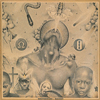 Some 27 years into their notorious career, Whitehouse deserves credit for trying new things. However, don't be mislead by cover artwork: the difference between this and their last album is so small that this one could have probably been called Asceticists 2007.
Some 27 years into their notorious career, Whitehouse deserves credit for trying new things. However, don't be mislead by cover artwork: the difference between this and their last album is so small that this one could have probably been called Asceticists 2007.
Being a Whitehouse "fan" can make for strange bedfellows. In the realms of the avant garde, this admission can cause some people to pass judgment immediately, as they have always been a very polarizing band, most either love or hate them. As one who does like them and has been a fan for a while, I would actually say that they have been on an upwards trend since Quality Time, each album growing a bit greater in depth and variety, and moving past the sophomoric lyrics of "I'm Coming Up Your Ass" that seemed to go so well with cheesy pornography and sticky peep booth floors. The trend towards more psychoanalytic lyrics mixed alongside digital noise (not just the same old mangled Wasp synth from the '80s) have made each new album something I'd look forward to. Which is why, in many ways, Racket is a let-down.
Coming only one year after the previous disc, Asceticists 2006, might have something to do with it. There is no major jump thematically or stylistically between the two albums, and considering the sub 30 minute duration of both discs, it feels like a full length CD being sold as two separate works. The most offensive musical link between the two is "Dumping More Fucking Rubbish," which is a simple re-recording of "Dumping The Fucking Rubbish" from Asceticists with a few extra lines. It's not quite as blatant as rehashing "A Cunt Like You" for both Mummy and Daddy and Cruise, but it comes close.
Factoring that out, there are two compelling instrumental tracks. The sustained siren horns of "Fairground Muscle Twitcher" open the disc just somewhere between ambience and noise. It's not as ear-shredding as most of their work, but it's not going to be heard in a new age shop anytime soon. "The Avalanche" is much more subtle though, almost gentle bell like tones and crystalline rattles that is very out of the norm for this band. The ending instrumental, "Bia Mintatu" amps the noise up a bit more, but not to chaotic levels: bassy horn sounds over African percussion, with a bit of the old power electronics squeal towards the end. William Bennett's fascination with Africa, beginning with the rumored self-created Extreme Music from Africa compilation is in full swing here.
This leaves three remaining tracks of "good ol'" Whitehouse, namely Philip Best and Bennett rambling over a harsh backing track. Best takes center stage on the vocals for the most part, which is more effective in my opinion. His angry rambling always seems to convey a better mood than Bennett's crazy cat lady caterwauling. "Dyad" makes for the best example of this: digitally manipulated djembe rhythms with both tag teaming the vocals with the best rage they could muster.
Racket is not a bad disc by any means; it just seems to follow too closely in its predecessor's footsteps to make it as instantly memorable as prior recent albums have been. I suppose there is no easy way to balance this, because either there is more material released for the listeners that is not as individually notable, or there are long waiting periods between discs. It most likely won't be nominated for any prestigious electronic arts awards this year, but it is still enjoyable, and does show their continuing mediating trend towards more conventional sounds. A "conventional" Whitehouse album sounds absurd, but it may happen in our lifetimes.
samples:
Read More
- Administrator
- Albums and Singles
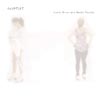 Daniel Menche is one of the most prolific and diverse noise artists currently active in the United States. Never being one to stick with a single theme or style, he has always been apt to try new instrumentation or approaches, and the output can either be scorchingly violent explosions, or subtle, meditative works. Kevin Drumm may not be quite as notorious, but has been steadily carving out his own niche in avant and improvisational circles, often based around his unique playing style on tabletop guitar. So the concept of these two working together is a daunting, yet satisfying one.
Daniel Menche is one of the most prolific and diverse noise artists currently active in the United States. Never being one to stick with a single theme or style, he has always been apt to try new instrumentation or approaches, and the output can either be scorchingly violent explosions, or subtle, meditative works. Kevin Drumm may not be quite as notorious, but has been steadily carving out his own niche in avant and improvisational circles, often based around his unique playing style on tabletop guitar. So the concept of these two working together is a daunting, yet satisfying one.
Drumm is credited with "guitar and noise" while Menche gets the honor of "organ and noise." And, of course, "noise" is the key word here. Over the span of the single 29 minute track, the two abuse whtever distortion boxes they happened to have handy, but go beyond just the expected "wall of sound" and instead create work that has its own subtle nuances. Within the first 10 minutes there is a fuzzed out wall of guitar noise that rivals the middle part of "You Made Me Realise" or the entire discography of Skullflower!, yet a closer listen reveals a subtle, almost hidden percussive element deep in the mix before Menche’s heavily processed organ makes its presence known.
Two thirds of the way through the wall of guitar noise is gone, replaced by hypnotic, psychedelic tones that may be organ, may be guitar, or may be any other noise creation device these two were using. The disc closes on a crunchy old school industrial/power electronics vibe, undulating distorted rhythmic loops and just a hint of musicality.
As a whole, Gauntlet comes on harsh and never lets up for the ride, yet shows the subtleties and nuances often associated with a more compositional type work. Sure, it can probably damage speakers and shoo small rodents out of any building, but slapping on the headphones leads to an entirely different, even more pleasurable experience.
samples:
Read More
- Administrator
- Albums and Singles
 Neal Campbell continues his strong run of releases as Astral Social Club. This album should satisfy fans of his impressive back catalogue, but the music here is good enough to deserve separate treatment and should not be caged in by references to the past.
Neal Campbell continues his strong run of releases as Astral Social Club. This album should satisfy fans of his impressive back catalogue, but the music here is good enough to deserve separate treatment and should not be caged in by references to the past."Tripel Foment" begins similarly to Campbell's other experiments in ambient beatscapes. A bassy, four-on-the-floor techno pluse pushes the track along pleasantly. But the track becomes compelling when he ditches that rhythm and lets his sounds fly untethered. The song keeps its momentum as scraps of sound detritrus float over the mix like luminous insects. At 12 minutes, the pitch bends up sharply as the song hits its crescendo. A looped guitar riff breaks in while a tremeloed static whirls in the foreground, carrying the beat for a few more minutes till a sudden and jolting rest ends the song.
The rest of the album lacks the percussive backbone which holds up "Tripel Foment," but they hold their own unhurried vitality. The title track meanders for more half its length before finding critical mass. Reversed chime swells and subdued guitar picking float lazily into a thicket of resonate beeps and flanged bellowing. The signal processing fights against this dense buildup, diluting the racket until it becomes a limp mass, percolating into gradual silence. "Big Spree" has the same meditative pacing, being built around a cloudy snyth drone peppered with icy, ringing tones that build into a snow storm of radiant sound particulate.
As detailed as each composition on this record is, they are certainly not fast paced. No song here is under 12 minutes, but Campbell is not the kind of musician that mistakes subtlety for monotony. Stale sounds are gently taken away from the mix or processed into something entirely different. The basic components are very simple: a three note guitar figure; pieces of static; some bells and chimes. Isolated from the whole they would sound thin and artificial, but within the tightly wound arrangements of this album they take on a cosmic immensity.
samples:
Read More
- John Kealy
- Albums and Singles
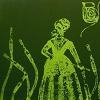
The noise is as aesthetically pleasing as most noise gets but there is no real substance to the two tracks on this single. Nodolby never hit the mind expanding assault of John Wiese nor is it rhythmic enough to pick up on the "Noise is the new rock" approach of Wolf Eyes. Instead it is too directionless, a mess of sound with no real purpose or feeling beyond an attempt to deafen the listener and failing in the attempt.
"Altered Beast" is the better of the two tracks, occasionally during its brief existence there is a flicker of life and an element of danger but mostly it just spits and growls its way to the end of the groove. Nodolby have the right intentions but do not fare well on this release.
Read More
- Administrator
- Albums and Singles
 Vogel Musik is the sort of album you prepare for listening to instead of being in the mood for. It is a challenging listen: the entire album, from the dense and dramatic music right down to the elegant sleeve (painted by Christoph Heemann), is an amazing piece of work that is full of wonderful and intriguing sounds.
Vogel Musik is the sort of album you prepare for listening to instead of being in the mood for. It is a challenging listen: the entire album, from the dense and dramatic music right down to the elegant sleeve (painted by Christoph Heemann), is an amazing piece of work that is full of wonderful and intriguing sounds.
In conveying the essence of birds, Fuchs is like a cubist painter in that there are elements of the familiar present but arranged in a way that is contrary to "normal" perception or interpretation. With the title of the opening piece, "Das grosse Huhn," the music makes perfect sense as an audio caricature of a big hen. Although, taken on its own it could be anything. This is not a criticism of the piece but rather shows how Fuchs can make such otherworldly music and leave enough clues for the listener to then ground themselves back in reality.
After two feminine and delicate pieces dedicated to hens there comes a bruiser of a piece in honor of the rooster. "Der Hahn" is full of aggressive drums and baritone saxophone, Fuchs and her companion Christoph Reiserer sound cock sure of themselves after the relatively gentle pieces that preceded this one. It is a strange piece (and that is saying something considering how strange all of this album is), while it fits with the rest of the music on Vogel Musik there is also something about it that sets it apart from the other tracks. I am not entirely sure I like it but I want to keep listening to find out.
The album revolves around its longest piece, "Fliegen." Flying is an obvious choice of subject matter for an album about birds but it is an odd concept to put in with music about chickens (not a bird renowned for its aerial distance). It is also a concept that has been interpreted musically for aeons, to the point where few artists can capture the magic of soaring through the air. However, Fuchs approaches it from a different angle to most. Instead of an epic score symbolising the power and freedom of flight, she plums for an isolationist view of flying. The stark nature of this piece conjures up feelings of icy winds to glide on through lonely skies. "Fliegen" further highlights Fuchs' way of taking a familiar idea and turning it on its head.
Vogel Musik may be too theatrical and fussy for some tastes but for those willing to put a little effort into listening, it is worth setting time aside for. It was difficult for the first couple of times I played it but with a little perseverance Vogel Musik revealed itself to be an album rich in texture and detail, I imagine there will always be something new to it every time I put it on.
samples:
Read More
- Administrator
- Albums and Singles
title: Likeness
catalog #: krank113
formats available: CD
release date: october 29, 2007
content: Likeness is the newest release from the duo of Tom and Christina Carter. Recorded over a period of several weeks during the Spring of 2006, the album is a return to the spontaneous composition of previous Charalambides records such as Houston and Union. With the exception of "The Good Life", which appeared in a primitive version on the Wholly Other CDR Home, all of the tracks on this release sprung forth after 'record' was pressed, and were fleshed out via overdubs, editing, and a malfunctioning space echo over the course of the next few months. Lyrical content largely derives from public domain American popular song from the turn of the 19th and 20th centuries, edited, rearranged, and largely deconstructed by Christina into abstract 'protest' songs for the century at hand. Musically, the album departs from the warm psych of A Vintage Burden in favor of the lush and layered vocal strata of Christina's later solo works, and a chillier, more abrasive guitar sound that favors the Velvets over the Byrds. Though containing much of the compositional concision that gave A Vintage Burden much of its appeal, the sound here just as frequently turns the corner into the abstract echoing spaces that characterise the more discordant sounds of Charalambides at the dawn of their kranky residency.
context: Charalambides has been recording and performing live in various configurations since 1991. Originally a duo comprised of Tom and Christina Carter, Charalambides released a cassette called Our Bed Is Green on their own Wholly Other label in 1992. The two Carters showed a firm grasp on the haunting nature of American blues and country, as well as a mastery of tape manipulation, a disregard for genre boundaries, and a tendency towards vertically stacked guitar drone. Charalambides has released nearly two dozen albums in various lineups since then, and in late 2003 returned to concentrating on their duo work, fusing introspective, open-ended, and often spacious song structures with blasts of feedback and explosive sound often startling to fans familiar only with the band's deceptively low-key reputation.
track listing: 1. Uncloudy Day 2. Do You See? 3. Figs and Oranges 4. Memory Takes Hold 5. The Good Life 6. Saddle Up My Pony 7. Feather In the Air 8. Walking Through the Graveyard 9. What You Do For Money
quotes:
"This far into their musical careers, Tom and Christina Carter still sound as if they are still peeling back the layers of their souls, never completely defining who they are, which is good, as the music is still fresh and vital, not the sound of rehashed obsolescence." - Urban Pollution
"It would surely be possible to name check a few other rural space progenitors, but the references would be so arcane as to be ridiculous." - The Wire
"Charalambides are not suited for everyman’s record collection, but the netherworld they forge is a musical feast, a field of music that explodes finely, like the sparklers you burn in the heart of a summer night." - Stop Smiling
"With a sound that seems at once both spacious and intimate, Tom and Christina Carter showcase their seemingly innate ability to lock into a shared orbit across the darkening sky, their luminous drift scaled down to its essential, irreducible core." - Pitchfork
Read More
- Administrator
- Albums and Singles
title: The Patron
catalog #: krank112
formats available: CD
release date: october 15, 2007
content: The Patron is the debut full length release by To Kill a Petty Bourgeoisie. The songs center around an underlying love story between two merging corporations that manage to capture the raw sentiment of isolation, profound discovery, and morbid betrayal. The Patron is about the corruption of an idea that is at first welcomed and later destroyed.
The recording process typically began with a basic vocal and guitar structure which was then slowy developed by adding electronics and manipulating sounds, until the orignal outline is blurred yet still identifiable. The steady passing of sounds and samples are most important to TKAPB’s recording process, and they rely heavily on the loss of translation between each pass.
But the importance of the technical details of any sound recording should be considered infinitesimally small when measured against the end result. Many sound artists have read both the pop and noise manifestoes and tried to join the two seemingly opposed theories into a cohesive whole, yet few have succeeded. Invariably, the artist makes a conscious or subconscious decision to stand firmly in the one camp where their beliefs truly lie and to occasionally tip the cap to the other to remind both themselves and the listener of their original intent. What TKAPB have produced however, is a near perfect storm of structure and chaos, melody and noise, the precise and the random, fused into their own unified musical theory of everything that at times soothes while simultaneously grabbing your throat.
context: To Kill a Petty Bourgeoisie consists of Jehna Wilhelm, guitar and vocals, and Mark McGee, electronics and sound manipulation. Originally from Richmond, VA, the duo has been involved with this project for 4 years and has been supported by an ever-changing cast of players and musicians. They now reside in Minneapolis, MN where they run their own label, The Riley Bushman Recordings & Archives, which they use as an outlet to release various projects and collaborations.
track listing:
1. The Patron 2. The Man With The Shovel, Is The Man I’m Going To Marry 3. Lovers & Liars
4. Long Arms 5. Dedicated Secretary, Liaison, Passionate Mother 6. I Box Twenty
7. You Guys Talk, We’ll Spill Our Guts 8. With Brass Songs They’ll Descend 9. Very Lovely
10. Window Shopping
Read More

